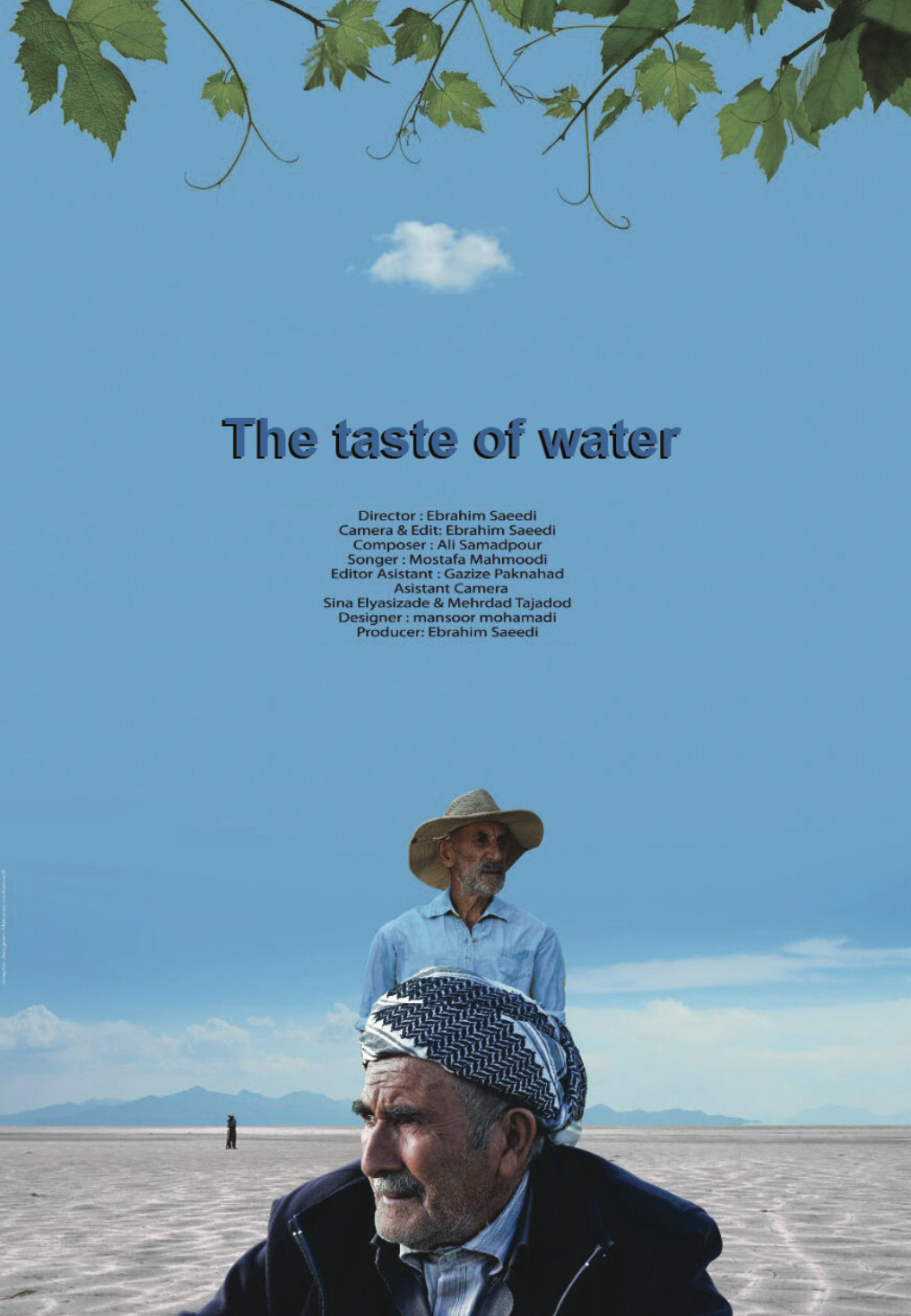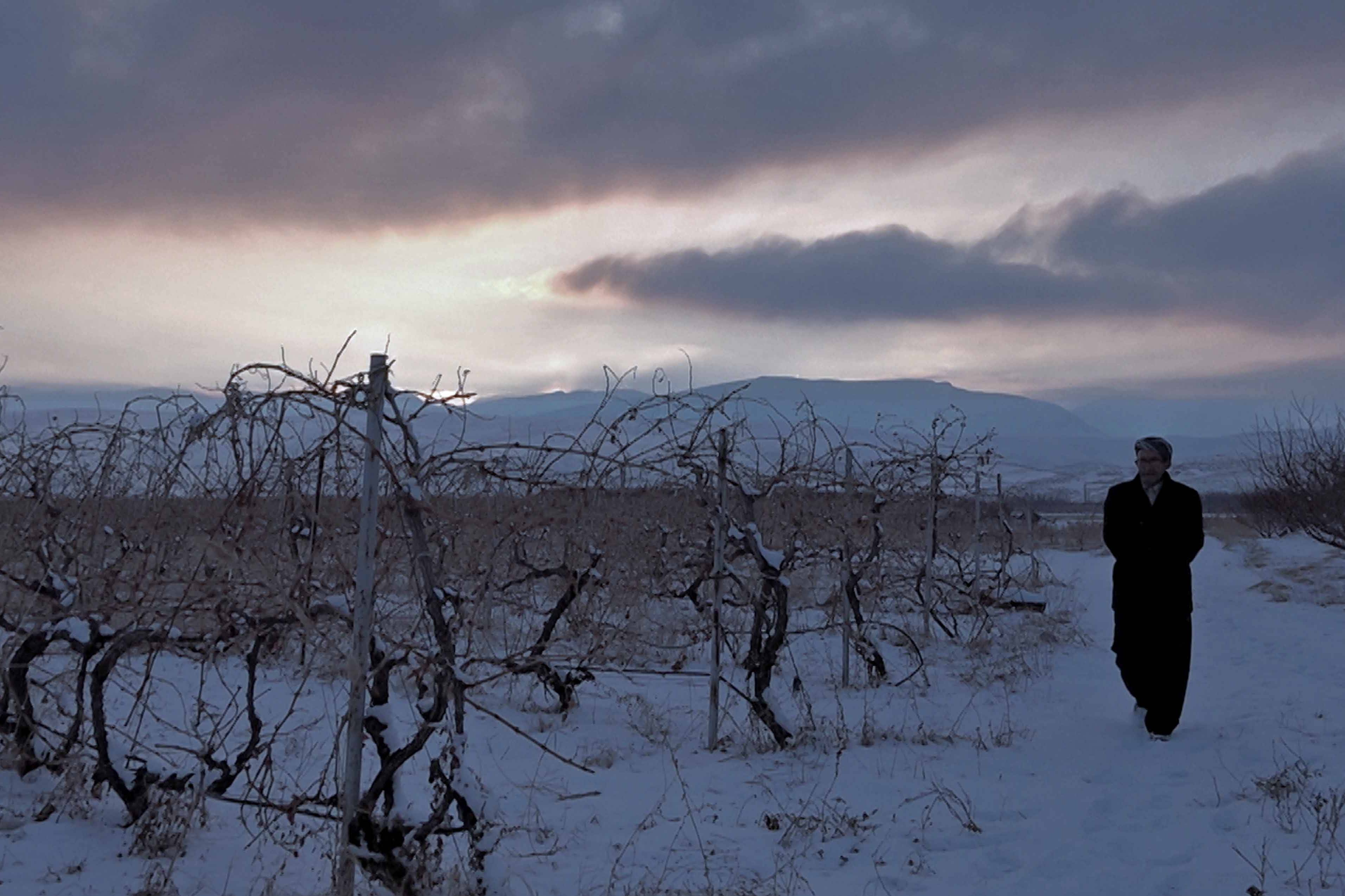The Taste of Water is a compelling new documentary feature film by Ebrahim Saeedi, an Iranian-Kurdish filmmaker. The film revolves around two grape farmers, one of Kurdish descent and the other Turkish, who reside in a village situated on the banks of Urmia Lake between the provinces of East and West Azerbaijan in Iran.
The film sheds light on the severe water scarcity that has plagued these farmers due to the significant shrinking of Urmia Lake over the years. Once a thriving body of water, it has now transformed into a harsh salt flat.
Born and raised by this lake, both farmers have dedicated their lives to farming – just like their parents before them – as it serves as their sole source of income. However, with climate change intensifying, their livelihoods have become increasingly threatened. Despite exhausting all available resources, including digging wells or purchasing water from trucks, no solution seems capable of alleviating their dilemma.

Both the Kurdish and Turkish farmers strive to support each other and safeguard each other’s farms. Nevertheless, with every passing day, they grow more helpless in combating this relentless environmental crisis.
Ebrahim emphasizes that his documentary focuses not solely on climate change but also on sociology and coexistence. He aims to showcase how Kurds and Turks in West Azerbaijan province unite against the adversities presented by climate change. Through his film’s narrative lens, he conveys the message that cooperation and support among Iran’s diverse ethnicities offer a far more constructive path than division.
“We must recognize that climate change does not discriminate against Kurds, Turks, or anyone else; it affects everyone equally,” said the director.
Formerly the Middle East’s largest saltwater lake and sixth-largest globally, Urmia Lake has suffered drastic shrinkage in recent years. This environmental catastrophe carries serious ecological, social, and political implications.
Consecutive droughts, agricultural water usage, and dam construction on rivers feeding the lake have contributed to the decline.

The lake, its islands, and surrounding wetlands also comprise significant habitats and are recognized as a UNESCO Biosphere Reserve, Ramsar site, and national park. This area serves as breeding grounds for waterfowl such as flamingos, white pelicans, and white-headed ducks. It also acts as an essential stopover for migratory species. However, with diminishing water levels, the lake has become increasingly salty.
This elevated salinity has given rise to salt storms that spread exposed salt from the lakebed across vast areas. These salt storms pose a potential threat to the fertility of the surrounding land and deal a severe blow to the region’s agricultural sector. Additionally, they heighten the risk of respiratory and skin diseases among the local population.
Ebrahim worked on The Taste of Water for six years. It effectively depicts how each passing year has seen a decline in water resources for farmers, while climate patterns become continue to grow more unpredictable and violent, with farmers witnessing unprecedented sandstorms. The documentary also depicts how the village has become deserted, with farmers forced to sell their lands and migrate.
The director was inspired to make this film because of his personal connection to Urmia Lake. “Twenty years ago, I used to swim in these waters alongside ships sailing on its surface; now it pains me deeply to witness this once vibrant lake being reduced to a deserted expanse of salt,” he laments.
The director added that water scarcity is currently one of Iran’s most pressing challenges. Numerous rivers and streams that have flowed throughout history have now dried up.

A passion for cinema
Ebrahim Saeedi, 59, was born in Mahabad, a city in northwestern Iran. He has been involved in the film industry for over 40 years. At the age of 11, he used to visit the Mahabad culture center for kids, where they would screen films. One of the teachers at the center was Ebrahim Khalili, a filmmaker who had his own video camera. When the Iranian Revolution began in 1979 against the Shah of Iran, Khalili would go out to film demonstrations and often asked young Ebrahim to assist him by giving him a recorder and microphone to record sounds. It was during this time that Ebrahim developed a love for documentary films.
“In my opinion, documentaries are more effective than other genres because people tend to listen more carefully when watching them,” said Ebrahim.
After completing high school, Ebrahim enrolled at Tehran University to study cinema with a specialization in editing.
Following the fall of Iraqi dictator Saddam Hussein in 2003, he started traveling regularly to the Kurdistan Region of Iraq (KRI) to make films. Throughout his career, he has directed and edited numerous films such as Eclipse (2001), All My Mothers (2009), Tired (2010), and Helin (2015). He also edited The Exam (2021) and recently completed The Taste of Water (2023).
Ebrahim gained recognition within the KRI after co-directing the documentary feature film All My Mothers in collaboration with Zahawi Sanjawi and Abbas Ghazali. In the film they depicted the heartbreaking stories of Kurdish women who had lost their husbands and children during Saddam’s genocidal campaign against Kurdish people in the 1980s. The film focused on several villages where these mothers, daughters, wives, and sisters mourned their losses, even decades later.
Speaking about the current state of Iran’s film industry, Ebrahim expressed his concerns regarding the impact of sanctions and international disputes on filmmaking.
“Especially for independent filmmakers, it is extremely challenging to find support and sponsorship within Iran,” explained Ebrahim. He also noted that seeking funding from outside sources, like Europe, raises suspicion among Iranian authorities. “It is better for us to protect ourselves,” he added.
Regarding the film industry in the KRI, Ebrahim believed there was still much room for growth and ambition. He hoped that Kurdish decision-makers and businesspeople would recognize the power of cinema as a medium to share Kurdish stories with the world.
“Cinema offers an unparalleled platform to express our experiences and narratives,” concluded Ebrahim. “Kurds have an abundance of stories waiting to be told.”
Qassim Khidhir has 15 years of experience in journalism and media development in Iraq. He has contributed to both local and international media outlets.

